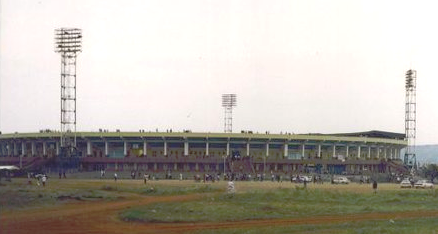Stade Amahoro on:
[Wikipedia]
[Google]
[Amazon]
 The Amahoro Stadium ( rw, Stade Amahoro; french: Stade Amahoro; Kinyarwanda for "Peace Stadium"), officially known as Amahoro National Stadium, is a multi-purpose stadium in the
The Amahoro Stadium ( rw, Stade Amahoro; french: Stade Amahoro; Kinyarwanda for "Peace Stadium"), officially known as Amahoro National Stadium, is a multi-purpose stadium in the
 The Amahoro Stadium ( rw, Stade Amahoro; french: Stade Amahoro; Kinyarwanda for "Peace Stadium"), officially known as Amahoro National Stadium, is a multi-purpose stadium in the
The Amahoro Stadium ( rw, Stade Amahoro; french: Stade Amahoro; Kinyarwanda for "Peace Stadium"), officially known as Amahoro National Stadium, is a multi-purpose stadium in the Gasabo
Gasabo is a Districts of Rwanda, district, (''akarere'') in Kigali, Kigali city, the capital of Rwanda. The headquarter of Gasabo is located in Remera Sector. The district also includes large areas of the city itself, including Kacyiru, Kimironko, ...
district of Kigali
Kigali () is the Capital (political), capital and largest city of Rwanda. It is near the nation's geographic centre in a region of rolling hills, with a series of valleys and ridges joined by steep slopes. As a primate city, Kigali has been Rwa ...
, Rwanda
Rwanda (; rw, u Rwanda ), officially the Republic of Rwanda, is a landlocked country in the Great Rift Valley of Central Africa, where the African Great Lakes region and Southeast Africa converge. Located a few degrees south of the Equator ...
. With a capacity of 25,000, it is the largest stadium in Rwanda and hosts football matches, concerts, and public events. The football clubs Armée Patriotique Rwandaise F.C.
Armée Patriotique Rwandaise Football Club (APR FC or APR) is a football club from Kigali in Rwanda. The club plays their home games at Amahoro Stadium. The club was founded in June 1993 as the team of the Rwandese Patriotic Front. History ...
and Rayon Sports F.C.
Rayon Sports Football Club is an association football club from Nyanza, Southern province, Rwanda, now based in Kigali. The team currently competes in the Rwanda National Football League, and plays its home games at the Stade Amahoro in Kigali a ...
are the tenants. The venue is also sometimes used for rugby union.
During the Rwandan genocide in 1994, it was temporarily a "UN Protected Site" hosting to up to 12,000 mainly Tutsi refugees.
History
The stadium was constructed by theChina Civil Engineering Construction Corporation
China Civil Engineering Construction Corporation Ltd. (abbreviation CCECC) was established in June 1979 under the approval of the State Council of the People's Republic of China.
It performs international contracting and economic cooperation, C ...
, at a cost of US$
The United States dollar (symbol: $; code: USD; also abbreviated US$ or U.S. Dollar, to distinguish it from other dollar-denominated currencies; referred to as the dollar, U.S. dollar, American dollar, or colloquially buck) is the official ...
21 million. Construction began in March 1984, and was completed in January 1989.
In 1990, the Rwandan Civil War broke out between the Rwandan Patriotic Front (RPF), a Tutsi rebel group, and President Juvenal Habyarimana
Decimus Junius Juvenalis (), known in English as Juvenal ( ), was a Roman poet active in the late first and early second century CE. He is the author of the collection of satirical poems known as the ''Satires''. The details of Juvenal's life ...
's government forces. The war ended in 1993 with a cease-fire and the signing of the Arusha Accords, which gave the RPF positions in a Broad-Based Transitional Government (BBTG) and the national army, and also provided for a United Nations peacekeeping force. This force was known as the United Nations Assistance Mission for Rwanda (UNAMIR), and was headed by Canadian general Roméo Dallaire. UNAMIR's initial headquarters was in the Hotel des Mille Collines
A hotel is an establishment that provides paid lodging on a short-term basis. Facilities provided inside a hotel room may range from a modest-quality mattress in a small room to large suites with bigger, higher-quality beds, a dresser, a ref ...
, but the upmarket hotel did not welcome the presence of soldiers, and Dallaire quickly sought an alternative location; after some days of searching, UNAMIR chose the Amahoro Stadium, which was large enough to host an entire battalion of soldiers. The headquarters was opened on 17 November 1993, with an official ceremony attended by Dallaire and President Habyarimana.
The cease-fire ended abruptly on 6 April 1994 when Habyarimana's plane was shot down and he was killed; the assassination served as the catalyst for the Rwandan genocide, which began within a few hours. The interim government began killing Tutsi and politically moderate Hutu, in well-planned attacks across the country. Tutsi civilians began seeking refuge in United Nations premises, and thousands of refugees gathered inside the Amahoro Stadium.
References
Cited works
* * * {{Kigali Amahoro Amahoro Buildings and structures in Kigali Sport in Kigali Multi-purpose stadiums in Rwanda Sports venues in Kigali Sport in Rwanda